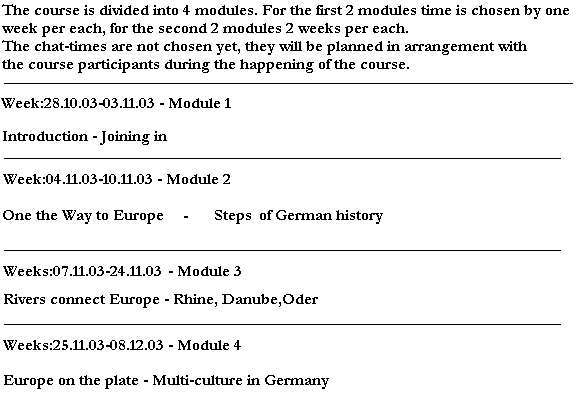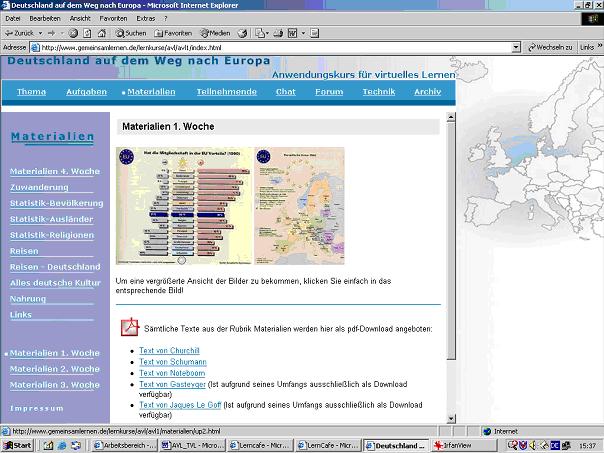Introduction
TvL - Technical Bases for Virtual Learning is a 4-week introductory course. In the course the most important technical knowledge is obtained for learning over the Internet. It concerns particularly communication. Explained and tested together are for example "mailing lists", "chat" and "forums". All techniques are tested together over the Internet. Besides learning the techniques, the participants win in this way an impression of the practice of "learning together over the Internet".Background
The model project " learning together" started in April 2000. Since then 10 "virtual learning groups " were initiated to work on different topics. Results and experiences of these learning are presented in detail in the web pages of www.gemeinsamlernen.de and www.lerncafe.de.
The past learning groups had various topics, such as "Homeland and Foreign Land", "Gender Roles", "Election Observation". Several learning projects were carried out jointly by older and younger people. For example in the learning project "Yesterday was Today" older people and pupils have read and discussed a novel together.
One experience was made in all learning groups: In virtual learning groups - apart from learning the selected topic - the handling the technology is learned particularly easily. When learning in the group, it becomes quickly clear which technical knowledge is really important and which is not.
On the other hand: as long as basis techniques for co-operation were not mastered, joint learning over the Internet was at first often cumbersome and sometimes frustrating.
From these experiences an idea of an introductory course came to being, in which the technical basics as well as the practice of learning in virtual groups could be tested in a playful way: TVL - technical bases for virtual learning.
Those, who after the course became interested in this form of learning, will also find the entry into virtual groups on other topics easier.
Such groups are organised over the www.gemeinsamlernen.de and increasingly over the "virtual learning network" (ViLE).
ViLE, which came to being on the basis of the model project "Learning Together" (Gemeinsamlernen), was founded in December 2002 as an association. Over the network "ViLE", parallel to virtual exchange, especially local cooperation should take place in local and regional groups.
Prerequisites
The course "TvL - technical bases for virtual learning" addresses all, who have no or little experience with "virtual learning". The course is designed in such a way, so that absolute Internet beginners can profit the same way as Internet "Experts ", who however still do not have experience with the exchange over the mailing lists, chats and forums.
The only conditions for participation are:
· Internet access
· Own eMail address and experience with writing mails
· Readiness to participate actively
Contents:
· 1.Module E-Mail - "Mailing List"
· 2.Module E-Mail - "Attachments"
· 3.Module Chat
· 4.Module Diskussion forum
· 5.Module Online time reduction: copy and paste & offline browsing
· 6.Module More on "Learning Together" and conclusions
Example of an AvL - an applied course of virtual learning
AvL 2: Germany in Europe - Europe in Germany
A historical, geographic and cultural perception
The introductory course TvL - technical basis for virtual learning, provided an introduction to the most important skills for learning over the Internet. This created the basis for this new, subject oriented course. The subject is Germany in Europe: how after the 1945 Germany became a part of the united Europe (the European Union) from historical and political view, which geographical facts have always contributed to European meetings and how in Germany European alliance came to being amongst the people through daily cultural relations. The personal experiences and exchange on the subject of Europe between the participants should be a central part of the communication in this course. The course will have 4 modules and last 6 weeks.
Conditions
Skills in using mailing lists, forum and chat as well as working with mail attachments and shortening of online times (copy and paste), preparedness for an active participation. Time needed: weekly approx. 3 hours and 30 minutes chat
Services:
· 4 didactically prepared modules
· Moderation and technical support
· Course materials
· Support materials on the subject
· Project homepage
Example: Course plan
Course plan - time plan - overview

Example: A course homepage


